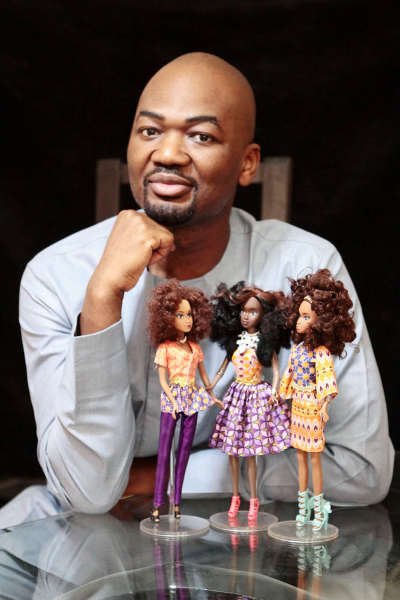TaofickOkoya is the founder of the indigenous doll factory, Queens of Africa. In this interview, he speaks about being in a doll making business and says being the son of the famous industrialist, Chief RazaqOkoya, did not open doors for him.
You are known to have started your business when you saw a gap in the market for ethnic dolls? The first dolls were made in 2006. How was your entry into the market and where did you get funding?
At the time, I was in the corporate gifts business. I like to interact with clients, listen to them and to get them an exact fit for their needs. Because of this experience, I had a lot of background in product research. When I first noticed the gap, I didn’t act on it immediately. Because it was only an idea at this stage, I wasn’t even sure that people would subscribe. After a while, I started to research. I prepared my proposals and laid out my plans. The process took about a year. I was fortunate in that I was able to use funds from my business to start the process. Once production was complete, I approached a bank to try to get financing to bring the goods into the country. It was a long run-around and after talking to so many of them, there was no funding from any. I ended up self-financing. In a way, it has worked out for the best because I’m not under financial pressure with the banks. I can more often decide to do things the way that I prefer to.
As for entry into the market, there wasn’t a “wow” reaction in any way. Caucasian-looking dolls still seemed a better and more acceptable option to the public. This just reinforced the idea that change was not going to come soon. It took about two years of going to exhibitions, granting interviews, being on television and radio for awareness to start. I talked about the psychology behind the dolls and the importance of being able to play with dolls made in a child’s likeness.
At the start, you were told that you wouldn’t be able to sell the dolls on the shelves of mainline stores in America. Would you say that this was sound advice?
It’s an ongoing process. I needed to understand how the market works, especially in America. Selling in larger stores might involve stocking seasonal or novelty items. That’s why we are trying to create awareness. With Caucasian dolls, there is universal appeal; everyone might buy one. I’m trying to say that Black dolls are not only for Black girls, as I said before, we want to educate people that black dolls can appeal across board. It is not a novelty; it is just a doll, period.
You have been quoted as saying that this is not just about dolls but about promoting African culture and encouraging a socio-cultural shift. How are you doing your bit?
What started as a doll business is now a project. We are all about promoting positivity and a good self-image. Girl-child empowerment education is very important. The dolls help children to understand that there is beauty in diversity; that we have different people from all over the world and we are all beautiful in our own way. That’s what I always say to my daughter. She used to favour the fair-skinned dolls but I can educate her to see the beauty in the darker skinned dolls, those that look like her. There are advantages and disadvantages in every ethnicity. You just have to appreciate who you are.
One of the things I enjoy is the fact that I am dealing with children. Between the ages of 0 and 4, they are in what we call the mopping-in stage – the developmental stage where they begin to see things and have an opinion. I believe that if we can input the positivity at that stage – the acceptance of your ethnicity, it can become entrenched for life.
We also promote our culture, country and Africa by adding interesting facts on the packaging of the dolls. These are there to encourage a child’s curiosity and to educate them. We want them to be proud of themselves. We use music lyrics; we have some books to do with the issues affecting the African girl-child. For example, the Gender Equality Bill that is currently on the hot burner. Where I might not lend my voice as an individual, but using the Queens of Africa platform, we can create awareness.
 Where would you say we are now?
Where would you say we are now?
For Nigerians, one of the unfortunate legacies of colonialism is that there tends to be a belief that anything foreign is superior. The only industry that I can see has made progress is the music industry. Years ago, local artistes tried to sound like their Western counterparts. Now there is a fusing of authentic Nigerian flavor; Nigerian music has found a formula that works. In terms of a socio-cultural shift, there is still a way to go but there is definitely increased awareness and acceptability. Queens of Africa has been able to drive this awareness because of the international presence that the project enjoys.
With the #buynaijatogrowthenaira campaign, has there been a positive impact on the business?
No there hasn’t. I will also put this under the bandwagon umbrella. The sentiment is good but when you say ‘buy Naija,’ what are you buying? Let’s look at it critically. Take ankara for example, do we have textile mills making them here? When we talk about furniture, do we have the commensurate raw materials industry? Are we exporting enough to boost foreign exchange earnings? This is one that directly affects what we do. It has been very difficult and expensive exporting the dolls out of Nigeria. Haphazard rules have many times forced us to resort to expensive alternatives. So, when we say ‘buy Naija’, we don’t yet have the infrastructure to support it. We are not exporting enough and are still only operating within.
What other challenges do you face in running a business in Nigeria?
The challenges in manufacturing are numerous. It can be so hard sometimes. I have touched on supporting infrastructure needing improvement and the disorganized export market. It would probably surprise people to be told that it is sometimes cheaper to ship between Nigeria and the USA than between Nigeria and other parts of West Africa. Even trying to get information is almost impossible although we hear that there are lots of supposed export initiatives. Then we can talk about the fact that there really isn’t a distribution network for the products. If it weren’t for Game Stores that stock our products, we would have no presence in Abuja and Port Harcourt, for instance, and distribution would be fairly unstructured. Most entrepreneurs will also encounter the problems with personnel. There are many who simply lack commitment or some who are unskilled and impossible to train. These all make the terrain tricky to navigate. I sometimes have to outsource or work with freelancers. It can get very frustrating. There is also a need for there to be consistency in our work and it is important to pay a keen attention to detail. Without these, we will not excel in any industry.
Do you not think that, sometimes, smaller businesses often cannot, or will not, offer competitive salaries and therefore do not attract a skilled workforce?
There’s a popular saying that if you pay peanuts, you get monkeys. Small businesses cannot afford a huge wage bill. However, I believe in value for money. If you value what an employee is bringing to your organisation, you will and should pay for it. We could also benefit from properly organised apprenticeships or entrepreneurship programmes. This way, both the employer and employee benefit. What you don’t pay in cash, they gain in experience on the job. For instance, the NYSC scheme helps in some way to achieve this. The Nigerian Labour Congress is proposing N56, 000 minimum wage. How many small businesses can afford that?
What then keeps you going when it seems that there is always going to be an uphill climb?
I started working in the family business before deciding to go it alone. Having made this decision, I then took time to reflect. I looked back at my twelve years’ experience before then and asked myself, “Where am I going?” If I were to die now, what would be my legacy? I made up my mind that whatever the case, it should always be a win-win-win approach. I will be working and earning a living but I also have to make an impact, not just in my own immediate sphere but around the world.
I’m here in my own little space in Nigeria and affecting people around the world; someone in Australia has had a positive experience after getting one of our dolls. We are affecting people in countries that I have never visited. That is what keeps me going. The business was meant to be a side thing and it has become the main thing that I do. I am a creative person. I challenge things; I enjoy the process of learning and discovering. The Queens of Africa has gone beyond just the dolls. Initially, the ambition was to just get the dolls in the market but it has become a project to promote positivity about the African girl-child. I made a vow that I want my work to be beneficial to the greater good.
With the prevailing macho culture in Nigeria and indeed many parts of the world, do you constantly have to deal with sarcastic comments about your line of business?
Yes I did initially. When I first started, people would ask, how could you go into the doll-making business? But I told them that I didn’t have to be a woman to address an issue related to women. I have a daughter. Will I wait until a woman comes along to come up with or execute an idea when I recognised a gap in the market? A good example of what I mean is William Wilberforce. He worked tirelessly for the abolition of slavery but he was a white European. We have to rise above social tags. If you become successful, people in any case then want to associate with you. They forget that you’re making dolls. Maintaining my purpose and vision outweighs any social tags
If you were to start over, is there anything that you would change?
In terms of concept and development, I did the best I could. Everything was well thought through. It was meant to be a side business but I always say that God gives an idea. All our steps have been ordained. Changes in design are ongoing. I believe so far that I have been led to this and would not change anything.
You must have picked up not a little experience on your entrepreneurial journey. What would you advise those about to embark on running their own business?
Pray hard and be focused. The journey into entrepreneurship isn’t easy. The tendency is for people to think, “I will be my own boss and my time is my own.” There’s more to it than that. You have to be a big picture thinker. You can’t be narrow-minded or have tunnel vision. During my journey, numerous people had a million and one ways for me to do things and whole lot of advice. Advice is good but you have to have your own perspective. You can’t afford to be easily swayed and jump onto every bandwagon. You will end up confused in that way. Think of what you want and what you want to achieve.
How would you describe your leadership style?
I would call it inclusive. I like it to be interactive. I believe that when I employ someone, besides knowledge in terms of education, they should bring exposure and experience. When they join my team, I’m not looking for plastic soldiers marching to one tune. I am able to oversee and if things are not working, I can come in but I don’t want to have to tell you what to do. We must discuss along the company guidelines and direction that we want to take the company but I like people to apply themselves. That is what makes a member of staff more valuable to the team. That is how you get fresh ideas.
 You are, of course, the son of industrialist and icon, Chief RazaqOkoya. How much of his genes do you think contribute to your entrepreneurial flair? Is it nature or nurture?
You are, of course, the son of industrialist and icon, Chief RazaqOkoya. How much of his genes do you think contribute to your entrepreneurial flair? Is it nature or nurture?
I feel that it is a bit of both, but probably more nurture. There are so many things that my father does that I wouldn’t necessarily do in the same way. That might also be due less to nature and more about a generational gap. I say nurture because from a very young age, I have been in a commercial environment within the family business (Eleganza Industries.) During the holidays, I would be involved in one activity or the other, perhaps at a factory or on the production floor. I witnessed plastic granules becoming the finished product. Without that background, I wouldn’t have thought it doable to manufacture. I probably wouldn’t have walked into a store looking for a dark-skinned doll, found none and decided that I could fill the gap in the market. I think the early exposure to manufacturing made me see those things as doable.
Would you say that having a recognisable name and coming from a privileged background have given you an advantage in starting and running your own business?
Conversely, it can sometimes be a hindrance. People make assumptions and behave accordingly. Especially in our society. Many times, I find myself being overcharged for a service. Vendors or potential clients think that you’re fair game; therefore, you can afford to be cheated. I had mentioned about trying to secure a loan when I was starting Queens of Africa. It later transpired that all the documentation was complete and the bank was satisfied that we could meet the required obligations. However, one look at the name and it was decided that I couldn’t be in urgent need of funds as I had the option of going to my father. It is very sad because it just doesn’t work that way.
Do you feel that you have to doubly prove yourself because of your father’s success in enterprise? Most certainly. When I first started the business, I would be preaching to investors and people perhaps saw me as flighty and I sometimes faced mockery. I got tired of explaining that it wasn’t about my dad, but about the business. It fired me up. I realised that I had to let my work speak for itself. The same people would come back with a proposition to invest in the business.
Who would you most like to walk through the door now and why?
Based on his personality, I would say Barack Obama. I think he tries to be fair and inclusive and that takes a whole lot of discipline. If I didn’t pick him, then I would say Hillary Clinton. It takes maturity and wisdom to do what she is doing. Although I am not deeply following American politics, I would like her to win the presidential race because it aligns with my passion for female empowerment. In the same way, I would want my daughter to learn that she can achieve her dreams and never to feel limited.
Away from work, what do you do to relax?
Before I got really busy, I liked to go to cafes, have a drink or two in a social, laid-back environment. I now find myself being more of a homebody. I watch a lot of TV – things that you can learn from and that expand your knowledge. I used to enjoy going to the gym – I enjoy walking but don’t get to do it enough. I love music and my taste cuts across all genres, depending on what I’m doing. I like pop oldies and classical music when I’m relaxing.








